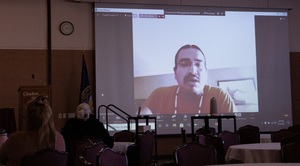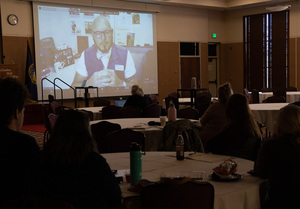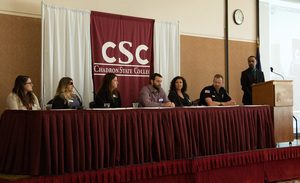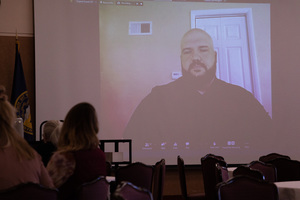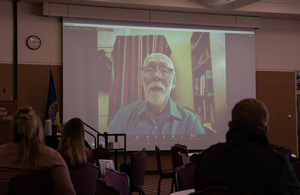Conference speakers emphasize benefits of forgiveness
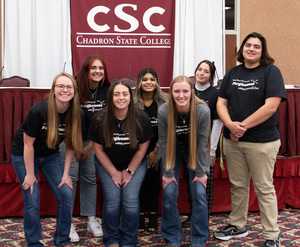
CHADRON – Speakers for the annual Chadron State College Social Work virtual conference emphasized the physical, emotional, and spiritual benefits of forgiveness.
Senior students enrolled in Methods III: Organizations and Communities (SW 435) organized the conference. They are Arianna Anderson of Newcastle, Wyo., Kimberly Barent of Rockville, Neb., Emma Bolyard of Brighton, Colo., Andrew Corbine of Box Elder, S.D., Erica Dardanes of Brush, Colo., Jamie Koenig of Chambers, Neb., and Ruth Mencia of Grand Island, Neb.
Keynote speaker Dr. Everett Worthington described a five-step process he created and named REACH. He told viewers to first Recall the hurt, then Empathize, think of forgiveness as an Altruistic gift, Commit, and Hold onto forgiveness.
Worthington said while going through the first step, the wronged person should refuse to feel like a victim and decide not to seek revenge. The second step, involves trying to see the situation from the other person’s view and then work through an imaginary conversation with that person to build sympathy and compassion.
In the third step, Worthington said a person should try to remember an instance when he or she was forgiven and the resulting feeling of freedom.
“By forgiving unselfishly, you can give that gift to someone who hurt you,” Worthington said.
He said the fourth step is deceptively simple.
“Write a note indicating that you are forgiving the person who hurt you,” Worthington said.
The fifth step involves re-reading the note created in the previous step to hold on to the commitment to forgive.
Worthington said those who spend time conscientiously trying to forgive will reap numerous physical and mental health benefits, while those who insist upon ruminating or reliving hurtful incidents will find it to be detrimental.
A panel discussion at lunch included personal and professional viewpoints of CSC faculty members Dr. Tara Wilson and Dr. Grant Sasse, Chadron Police Chief Rick Hickstein, Public Defender Becca Chasek, Sarah Hageman with Chadron Community Hospital's hospice program, and Mandy Price, a mental health provider.
Following the panel, Pastor Tanner Sherlock said understanding why others cause us trauma is not as important as acceptance of the situation.
“There’s no copy and paste solution that works for every case. Forgiveness can be messy, painful, difficult, and take a long time. Turn the pain into something positive,” said Sherlock, an alumnus and Director of Chi Alpha at CSC.
Executive Director at Mediation West in Scottsbluff, Nebraska, Charles A. Lieske spoke about the differences between restorative justice and retributive justice.
“In restorative justice, victims are central, and the focus is on problem solving and repairing harm. This contrasts with placing blame, punishing, and an adversarial dynamic in retributive justice,” Lieske said.
He shared several true stories of victims who actively sought out tried to improve the lives of their assailants. In the cases he highlighted, both the victims and perpetrators benefitted from restorative justice.
“Lack of hope feeds poor decision making. Forgiveness brings peace and hope and feeds better decision making,” Lieske said.
Shawn Banzhaf, Chadron native, CSC graduate, and Assistant Director of Student Success at the Pat Tillman Veteran Center at Arizona State University, organized his remarks into an acrostic poem that spelled Forgive.
According to Banzhaf, the first letter stands for Fault being properly assigned to the offender.
“Second, open your heart to be loved. Third, re-invent who you are, the best version of yourself. Then, grow your ability to love again. Invite those around you to join the fight. It takes more than just you. We need community,” Banzhaf said.
The letter V stands for vulnerability, and E represents individuals who enable the end of generational trauma, according to Banzhaf.
The final speaker, Edison Red Nest III, recounted the history of Native American people and alcohol. Red Nest III, executive director of Native Futures in Alliance, said all those who have decided to live a sober life have experienced success even after initially encountering difficulty.
Nebraska State College System Chancellor Paul Turman concluded the conference with brief remarks complimenting the speakers and congratulating the students for organizing a meaningful event.
Category: Campus Events, Campus News, Social Work

